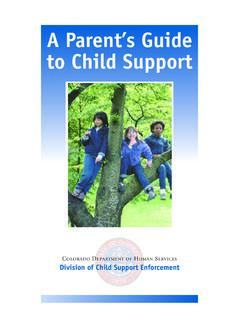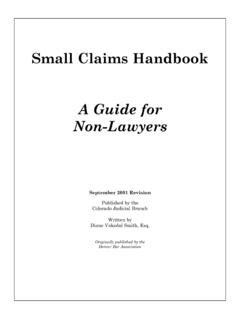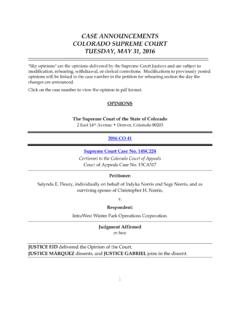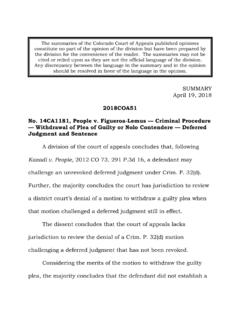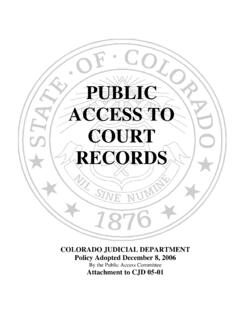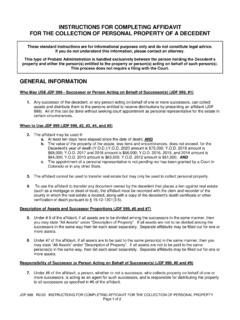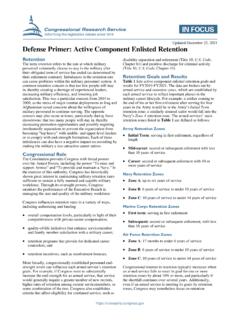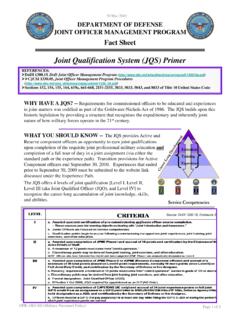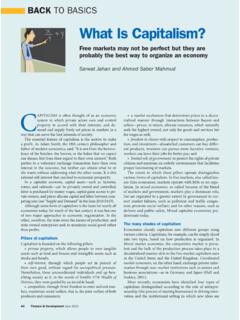Transcription of Colorado Courts At A Glance
1 1 Colorado CourtsAt AGlanceColorado Courts At A Glance is published by theColorado Judicial BranchOffice of the State Court Administrator1300 Broadway, Suite 1200 Denver, CO 80203(Published 2015)A Message from the Chief Justiceof the Colorado Supreme CourtThank you for your interest in the Colorado Judicial Branch, one of the three branches of government working independently for a common goal: to protect the rule of law, the ideal that our country s founders worked so hard to Colorado Judicial Branch is charged with two responsibilities: resolving disputes and supervising offenders on probation. By resolving disputes according to the rule of law, the judiciary furthers the founders paramount principal that we are a government of laws and not people. No one is above the law; our Courts protect individual rights and are open to busy state court system has four levels of Courts : county Courts , district Courts , the Court of Appeals and the Supreme Court.
2 County Courts handle about 450,000 case filings per year, and the district Courts including our seven specially designated water Courts handle about 235,000 cases per year. The 22 judges of the Court of Appeals, sitting in panels of three, handle about 2,500 cases annually, and the seven-member Supreme Court, in which all justices hear each case, receive about 1,500 case filings each document provides an overview of Colorado s state Courts and the justice system in order to help you better understand how the Courts function and what rights you have in the Courts . We believe a more complete understanding of the justice system also will help all citizens appreciate the important role an independent judiciary plays in protecting their constitutional rights. We hope you find this document useful and also invite you to visit the Branch s headquarters in downtown Denver to view beautiful artwork and learn more about the Courts and the rule of law in the Judicial Learning Center, which is open Monday-Friday, 8 to 5 Admission is always free of charge.
3 Nancy E. Rice Colorado Supreme Court Chief Justice2 IntroductionYour rights in courtColorado s Courts play important roles in your life. When you buy or sell goods or property, get married or divorced, have children, work, retire, drive a car, and even after you die, your state Courts can protect your rights and enforce your responsibilities. If you are the victim of a crime, are accused of committing a crime, or witness a crime, you may be required to appear in a Colorado court. You may also be called upon to serve as a juror, one of the most important privileges we all share as addition to state Courts , there are federal Courts in Colorado that deal with federal laws, such as bankruptcies and matters involving the United States Constitution.
4 This document does not discuss federal Courts . They are part of a parallel but entirely different judicial booklet is designed to answer questions that you, the people of Colorado , may have about your state judicial branch. The following few pages present an overview of the Colorado Judicial Branch how it works and how it affects you. A glossary containing legal terms is provided beginning on page you are arrested or charged with a crime, even some types of traffic violations, you have certain constitutional rights. It is wise to exercise these rights even if you later decide to plead guilty to the are these rights? You have the right to remain silent and to refuse to answer any questions asked by police officers and other officials about the event. Anything you say may be used against you.
5 You have the right to have a lawyer represent you. If you cannot afford to pay for a lawyer, you can ask the judge to appoint one for you. You have the right to a public and speedy trial, either by a jury or a judge only. You are not required to prove your innocence; instead, you are presumed innocent of any crime unless the district attorney (city attorney in a municipal court) presents sufficient evidence to prove your guilt beyond a reasonable doubt. You are entitled to testify in your own defense if you want to, but you cannot be forced to testify. You or your attorney may cross-examine any person who testifies against you. You are allowed to bring in witnesses, and the judge can order any person you want as a witness to appear in you are found guilty, you have the right to appeal. You also have the right to make a statement or present additional information to the judge at the time of sentencing.
6 The judge decides the sentence unless the death penalty is a possibility, in which case the jury of private rights and duties are considered civil cases. Suits can be brought for such matters as the recovery of damages from negligence, breach of contract, or violation of civil rights. The court does not appoint attorneys in civil cases; however, legal aid services may be available for people who cannot afford a lawyer to represent them in civil law cases involving such matters as dissolution of marriage (divorce), child support, allocation of parental responsibility, and dependency and neglect also are considered civil cases. People who cannot afford legal representation for family law cases also may qualify for legal aid services or for court-appointed more information on our Courts , please click of courtsSeveral different Courts in Colorado handle various kinds of cases.
7 These Courts are:MUNICIPAL COURTSM unicipal (city) Courts deal with violations of city laws committed within the city limits. Generally, these laws involve traffic, shoplifting, and minor offenses such as dog leash-law violations and disturbances. For some cases, you may have the right to a jury trial and to tell your side of the story in municipal court. Municipal Courts are not state Courts ; however, you may appeal a municipal court decision to a state COURTSE very county in the state has a county court, with at least one county judge. These Courts handle traffic cases and minor criminal matters, as well as civil actions involving no more than $15,000. You may have a jury trial in many types of county court cases. An appeal from a county court decision may be made to the district COURTSS mall-claims Courts are divisions of county court.
8 Individuals are allowed to argue their own cases and to have speedy decisions on civil matters involving no more than $7,500. Court sessions are held during the day or evening to accommodate the public. There are no jury trials in small claims Courts , and sometimes a magistrate hears the cases instead of a judge. Normally, neither side may be represented by an attorney. No plaintiff may file more than two claims per month or 18 claims per year in small-claims COURTSD enver s court system differs from those in the rest of the state, in part because Denver is both a city and a Denver County Court functions as a municipal as well as a county court and is paid for entirely by Denver taxes rather than by state County Court judges are appointed by the mayor of the city of Denver. Denver has the only separate juvenile court and separate probate court in the state.
9 In other parts of Colorado , district Courts handle juvenile and probate matters. The Denver juvenile and probate Courts are state Courts , along with Denver District COURTSEach county in the state is served by a district court. Colorado is divided into 22 judicial districts, many encompassing more than one county. Unlike county Courts , where there is at least one judge per county, district judges are assigned to the judicial district and may serve more than one county within that judicial district, particularly in rural areas of the state, where as many as seven counties may be included in a Courts have authority to handle many types of cases, including dissolution of marriage (divorce), civil claims in any amount, juvenile matters, probate (estates), mental health, and criminal matters.
10 You may appeal a district court decision to the Colorado Court of Appeals and/or to the Colorado Supreme COURTSC olorado has seven water Courts , one in each of the major river basins (South Platte, Arkansas, Rio Grande, Gunnison, Colorado , White, and San Juan rivers). Water court is a division of district court, and the Supreme Court appoints a district court judge from within each river basin to act as water judge. Other personnel include the clerk of the water court and a water referee, who investigates applications for water rights and has the authority under a water judge s supervision to rule on such applications and other related matters. Water Courts have exclusive jurisdiction over water rights. Cases relating to the determination of water rights and the uses and administration of water resources are determined by water judges.
